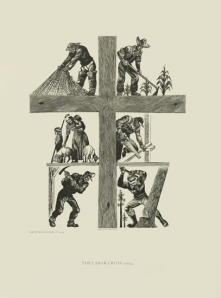 What does Labor Day have to do with our faith? While it is not a feast on our liturgical calendar, Labor Day reinforces important values as Catholics. Based on our beliefs, the Church has certain teachings on just wages and the value of work. Every human person is valued and important. The value in work is derived from the value and dignity of the human person, which comes prior to their interaction with society, not through the end result of their work. Through work, we honor God’s creation and the talents he has given to us. It unites us, in our labors, with the work and sufferings of Christ, and therefore contributes to our sanctification. Every human person is called to work: it is what distinguishes us from other creatures. Here are some excerpts from the Catechism:
What does Labor Day have to do with our faith? While it is not a feast on our liturgical calendar, Labor Day reinforces important values as Catholics. Based on our beliefs, the Church has certain teachings on just wages and the value of work. Every human person is valued and important. The value in work is derived from the value and dignity of the human person, which comes prior to their interaction with society, not through the end result of their work. Through work, we honor God’s creation and the talents he has given to us. It unites us, in our labors, with the work and sufferings of Christ, and therefore contributes to our sanctification. Every human person is called to work: it is what distinguishes us from other creatures. Here are some excerpts from the Catechism:
“Human work proceeds directly from persons created in the image of God and called to prolong the work of creation by subduing the earth, both with and for one another. (…) It can also be redemptive… Work can be a means of sanctification and a way of animating earthly realities with the Spirit of Christ.” (CCC 2427) “In work, the person exercises and fulfills in part the potential inscribed in his nature. The primordial value of labor stems from man himself, its author and its beneficiary. Work is for man, not man for work.” (CCC 2428)
The Church also teaches that each person should receive appropriate remuneration for their work as a matter of justice. Employers should keep in mind not only an agreement between themselves and the person on the amount of the wages, but also the importance of the family, especially to supporting and valuing the family, in determining wages. This also includes the right and the value of rest.
“A just wage is the legitimate fruit of work. To refuse or withhold it can be a grave injustice. In determining fair pay both the needs and the contributions of each person must be taken into account. ‘Remuneration for work should guarantee man the opportunity to provide a dignified livelihood for himself and his family on the material, social, cultural, and spiritual level, taking into account the role and the productivity of each, the state of the business, and the common good.’ Agreement between the parties is not sufficient to justify morally the amount to be received in wages.” (CCC 2434)
The Church has a rich teaching on the value of human work as participation in the creative work of God, emphasizing the dignity of the human person. If you are interested in more reading on the subject, check out Blessed John Paul II’s encyclical on work, “Laborem exercens.”

